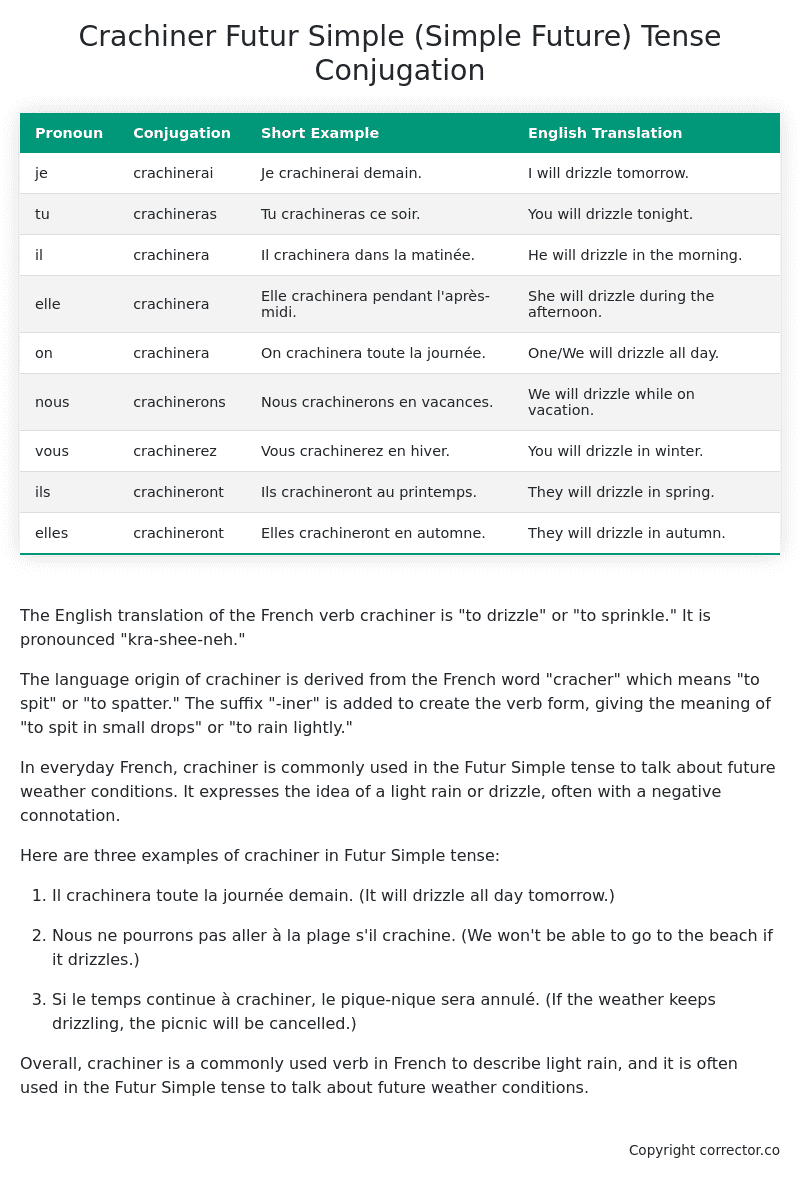Futur Simple (Simple Future) Tense Conjugation of the French Verb crachiner
Introduction to the verb crachiner
The English translation of the French verb crachiner is “to drizzle” or “to sprinkle.” It is pronounced “kra-shee-neh.”
The language origin of crachiner is derived from the French word “cracher” which means “to spit” or “to spatter.” The suffix “-iner” is added to create the verb form, giving the meaning of “to spit in small drops” or “to rain lightly.”
In everyday French, crachiner is commonly used in the Futur Simple tense to talk about future weather conditions. It expresses the idea of a light rain or drizzle, often with a negative connotation.
Here are three examples of crachiner in Futur Simple tense:
-
Il crachinera toute la journée demain. (It will drizzle all day tomorrow.)
-
Nous ne pourrons pas aller à la plage s’il crachine. (We won’t be able to go to the beach if it drizzles.)
-
Si le temps continue à crachiner, le pique-nique sera annulé. (If the weather keeps drizzling, the picnic will be cancelled.)
Overall, crachiner is a commonly used verb in French to describe light rain, and it is often used in the Futur Simple tense to talk about future weather conditions.
Table of the Futur Simple (Simple Future) Tense Conjugation of crachiner
| Pronoun | Conjugation | Short Example | English Translation |
|---|---|---|---|
| je | crachinerai | Je crachinerai demain. | I will drizzle tomorrow. |
| tu | crachineras | Tu crachineras ce soir. | You will drizzle tonight. |
| il | crachinera | Il crachinera dans la matinée. | He will drizzle in the morning. |
| elle | crachinera | Elle crachinera pendant l’après-midi. | She will drizzle during the afternoon. |
| on | crachinera | On crachinera toute la journée. | One/We will drizzle all day. |
| nous | crachinerons | Nous crachinerons en vacances. | We will drizzle while on vacation. |
| vous | crachinerez | Vous crachinerez en hiver. | You will drizzle in winter. |
| ils | crachineront | Ils crachineront au printemps. | They will drizzle in spring. |
| elles | crachineront | Elles crachineront en automne. | They will drizzle in autumn. |
Other Conjugations for Crachiner.
Le Present (Present Tense) Conjugation of the French Verb crachiner
Imparfait (Imperfect) Tense Conjugation of the French Verb crachiner
Passé Simple (Simple Past) Tense Conjugation of the French Verb crachiner
Passé Composé (Present Perfect) Tense Conjugation of the French Verb crachiner
Futur Simple (Simple Future) Tense Conjugation of the French Verb crachiner (this article)
Futur Proche (Near Future) Tense Conjugation of the French Verb crachiner
Plus-que-parfait (Pluperfect) Tense Conjugation of the French Verb crachiner
Passé Antérieur (Past Anterior) Tense Conjugation of the French Verb crachiner
Futur Antérieur (Future Anterior) Tense Conjugation of the French Verb crachiner
Subjonctif Présent (Subjunctive Present) Tense Conjugation of the French Verb crachiner
Subjonctif Passé (Subjunctive Past) Tense Conjugation of the French Verb crachiner
Subjonctif Imparfait (Subjunctive Imperfect) Tense Conjugation of the French Verb crachiner
Subjonctif Plus-que-parfait (Subjunctive Pluperfect) Tense Conjugation of the French Verb crachiner
Conditionnel Présent (Conditional Present) Tense Conjugation of the French Verb crachiner
Conditionnel Passé (Conditional Past) Tense Conjugation of the French Verb crachiner
L’impératif Présent (Imperative Present) Tense Conjugation of the French Verb crachiner
L’infinitif Présent (Infinitive Present) Tense Conjugation of the French Verb crachiner
Struggling with French verbs or the language in general? Why not use our free French Grammar Checker – no registration required!
Get a FREE Download Study Sheet of this Conjugation 🔥
Simply right click the image below, click “save image” and get your free reference for the crachiner Futur Simple tense conjugation!

Crachiner – About the French Futur Simple (Simple Future) Tense
Formation of Futur Simple
For regular -er verbs (e.g., parler – to speak)
For regular -ir verbs (e.g., finir – to finish)
For regular -re verbs (e.g., vendre – to sell)
Common Everyday Usage Patterns
Conditional Statements
Interactions with Other Tenses
Futur Antérieur
Conditional
Present
Summary
I hope you enjoyed this article on the verb crachiner. Still in a learning mood? Check out another TOTALLY random French verb conjugation!


